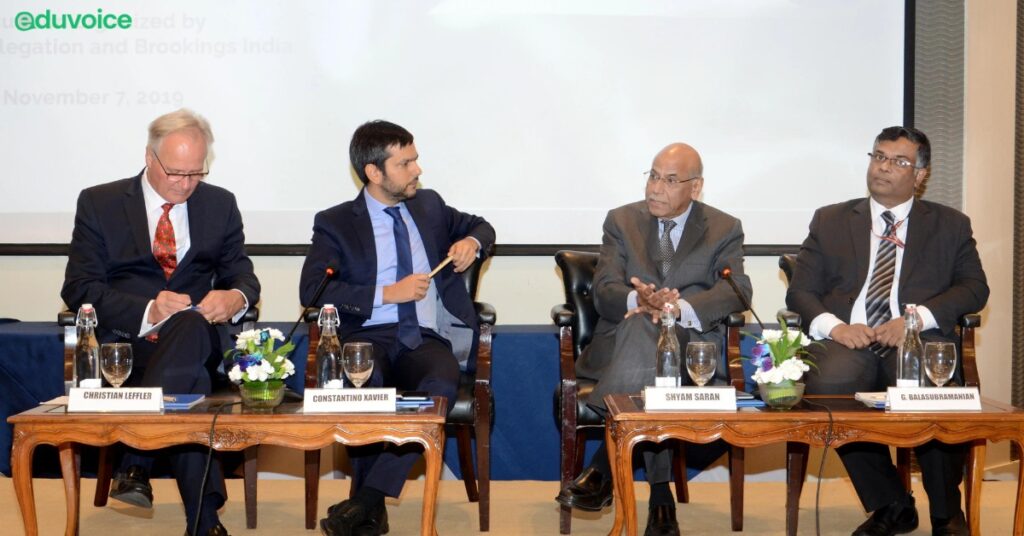The Council of European Union (EU) Chamber of Commerce in India under the aegis of the Education Committee conducted its second EU India Education Summit on Friday, March 17 at the Taj Mahal Palace, Mumbai.
Maharashtra School Education Minister Shri Deepak Kesarkar, who served as the Chief Guest of the Summit, was joined by EU Council representatives.
Minister Kesarkar highlighted how Maharashtra is working on developing NEP and found common ground in the government’s efforts to recognise education in one’s mother tongue with the European dignitaries present in the audience.
“Though English is a common language in Indian schools and colleges, most European countries teach subjects to students in their mother tongues. For research, you need scientific data, not language,” stated Kesarkar, who highlighted that Indians can fulfil Europe’s labour needs through various partnerships.
“We can build Centres of Excellence with Europe, while also equipping students with the knowledge of AI, Computing, Robotics, etc shortly,” added the Minister.
European representatives see hope in building partnerships in India
The Council’s first-panel discussion focused on the changing landscape of transnational partnerships for higher education & skills.
The discussion, which was moderated by Dr. Salunkhe, had the participation of Erik af Hällström, Consul General, Consulate General of Finland, Ferenc Jari, Consul General, Consulate General of Hungary, Vanesa Álvarez Franco, Economic and Commercial Counsellor, Economic & Commercial Office in Mumbai, Embassy of Spain, and Arun Thekkadth, who represented Neso India, the Dutch arm of promoting higher education programmes.
“Spain can be a primary destination for international students, especially Indians. We also see a future where students from both countries can experience their study journey in each other’s nations. Such initiatives will help build a broader linkage between both Spain and India as currently, the relationship is not that developed,” stated Vanesa, who added that people-to-people exchange is necessary.
Other countries like Hungary, which have also started taking steps to bring international students, have started working on initiatives to attract the latter.
“We are contributing around 600 million Euros towards scholarships for developing countries. 200 Indian citizens have the opportunity to study in Hungarian universities through the Indian government, the expenses of which are taken care of. So overall we understand the function of globalisation and the need to build transnational partnerships,” stated Hungarian Consul General Ferenc Jari.
Finland’s achievements as a trailblazer in the educational field were also highlighted as a model for the world to go by, especially for India’s young students.
“In Finland, most schools are given autonomy and the ability to facilitate sports and social interactions instead of overloading students with subjects,” said Finland’s Consul General Erik, who added that the country is also motivated by India’s achievements, especially in the IT sector.
The Netherlands, which is known for its touristy features, has also enhanced its academic capabilities over the years which plays into the country’s mobility goals.
“Indian students are the second largest group of international pupils in the Netherlands and are offered a lot of scholarships. In the last four years we have witnessed that most Indian students are studying in the Netherlands and coming back to India to put their skills to use,” said Arun Thekkedath, who serves as the Chief Representative Officer at Neso India, Consulate General of Netherlands.
With Covid-19 opening up the idea of remote education and work, European countries shared varied ideas on continuing with the model and its future.
“Online education being a possibility, there are cheaper and easier ways available to provide quality education. We have learned that we don’t have to move around as much to provide transnational education like earlier,” stated Vanesa.
Foreign university representatives hail tech, industry’s role
The second-panel discussion saw a representation of University representatives, namely Prof. Christer Nygren, Malardalen University, Sweden, Maud LE BARS, Rennes School of Business, France, and Prof. Lars Hulgaard, Roskilde University, Denmark. The discussion also had the presence of Mr. Kartikeya A, OSD to Minister of Finance & Skill Development, Government of Andhra Pradesh, and Mr. Koustubh Kanade, Vice-President Marketing & Executive Projects, B Braun Medical.
The discussion was moderated by Prof. T. M Sathyanarayanan, Director, Overseas Education Consultancy Services & Co-Chairman, Education Committee, EU Chambers and Dean, of Academic Affairs, TISS Mumbai, Prof P K Shajahan.
“All aspects of society are important in building sustainable education. One example is the advent of ChatGPT in November which is now being used across the globe in academics. It’s interesting to see how the chatbot is being used to teach students and can provide an optimistic view of technology to others,” explained Prof.Lans Huggard.
The role of technology in cross-border learning was explored by Maud LE BARS.
“We are trying our best to explore a lot of opportunities in India across regions. We appreciate states such as Andhra Pradesh, which are spearheading a lot of tech initiatives that can prove to be helpful. I think technology is allowing a lot of innovation and change,” stated Maud.
Indian students have proved to be increasingly important for European countries, according to Swedish professor Christer Nygren.
“We are trying to make access to scholarships easier for Indian students. Erasmus scholarship has also become popular among them,” stated Nygren.
The Summit was attended by over 150 distinguished guests from the fields of business, education, civil service, and more.
For More Such Articles, News Update, Events, and Many More Click Here






